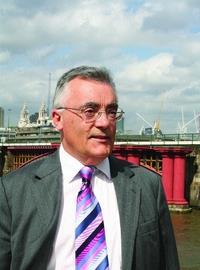New CIBSE president John Armstrong talks to Dave Arminas about his agenda to make the institution more socially aware – and why you need to get to know your facilities manager better.
How did you move into building management?
After a general engineering degree at Loughborough University my first job was looking at maintenance of steel-making plant. Then at Michelin Tyres I did project development and critical path techniques. From 1972 to 1980 I was in local and regional health services in the Stoke on Trent area doing planned building maintenance and back-up systems.
I then moved to BSRIA, a very special place to work. I studied how people ran buildings and I talked with many public and private sector organisations. At Barclays Bank from 1988 to 1999 I looked at major building maintenance. After taking early retirement I moved to Arup and worked with MoD Estates putting together guidance material on building management systems. I now run my own consultancy.
You studied for a masters what was it about?
The topic was operations maintenance manuals, the logic and process of setting out a guide. It may be fairly mundane but our industry had never been good at it. It was research-based and done in parallel with BSRIA work. I talked to service designers, users of products and manufacturers of equipment. It was basically a guide about how to write a guide. I looked at what topics need to be included, where you get information, who has the information within organisations, who should write the manual and even the costs of producing one. Until about four years ago it was still the authoritative guide to writing a manual.
During your year as president-elect, you toured Dubai and Hong Kong. What did you learn?
It is fascinating how they make use of every bit of space, moving upwards because there is little space outwards. Before going I had the impression that everybody is always on top of each other. That’s not so.
In terms of building services, they thrive on design problems and solutions. They realise they need a better feel for running buildings and they must use less of major services such as water. With a large percentage of CIBSE membership in Hong Kong, it’s a huge marketing opportunity for launching into mainland China with its massive construction programme. My predecessor, David Hughes, is now in Hong Kong – he has strong links in the area and he'll be a resource for me.
You say collection of building performance data could be better. How important is this?
Very. One of the things that will push us in better data management is the EU’s Energy Performance Buildings Directive. In about 18 months, big air-conditioning plant will need an independent inspection.
CIBSE is already moving down that road with its Low Carbon Consultants Register that provides a recognised competency to understand and apply low-carbon applications on design, operation and simulation. This will help establish good practice. Some of the more enlightened clients will be looking to publish this data in their annual reports. Everybody wants to show they are better than somebody else, such as Marks and Spencer, Tesco and Sainsbury. It’s such a big political issue now.
On the subject of politics, why did you bring up contraction and convergence in your speech?
On the contraction side we have power as an institution to help designers understand how to make better use of energy in buildings. That is what our learned society is all about.
The convergence aspect was an opportunity for me to focus the debate on how the people in buildings use the energy. Showing how much energy people use in other parts of the world makes those here more aware of their own consumption. We have to put in services that people understand to encourage them to use less energy, less water in the future. We can’t carry on as we are going.
Convergence allows countries such as China to be less sustainable in their designs. If CIBSE is going into China, does it not mean an uneven playing field in, say, London and Shanghai?
As an institution we have the opportunity to develop better technology and share it with the Beijings and Shanghais of the world to make them understand it is cost-effective to conserve energy. Our manufacturing and knowledge has incredible potential but we have not always been the best at making money out of our ideas. This is a big part of convergence.
I thought my speech might have been seen as more controversial, but the feedback is that I have touched a sympathetic nerve.
It appears you are asking CIBSE to more socially aware of energy consumption. Has CIBSE stayed away from discussing political issues?
CIBSE is a learned institution and very good at the mechanics of the design process. But in terms of the social nature of what we are doing, I think CIBSE has never felt that is where it wants to be. But we are providing the internal environment for virtually everybody in the UK and that is an issue we need to consider, especially with the rise of climate change and carbon footprints – so much comes down to individuals taking a more responsible role. We ought to be aware of what influence we have on people’s lives and use that influence.
Do you have one message for CIBSE members as you embark upon your year?
It was the core of the presidential speech – talk to facilities managers to find out how buildings and equipment are used.
How will you define success at the end of your year?
If CIBSE members get more recognition of the job they do, if they have more confidence in themselves and know the importance of what they do, then I have made a step worth taking.
Source
Building Sustainable Design





















No comments yet